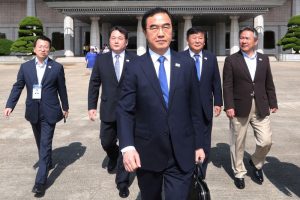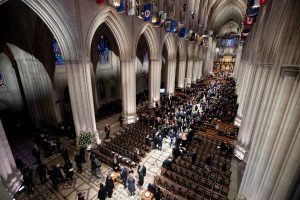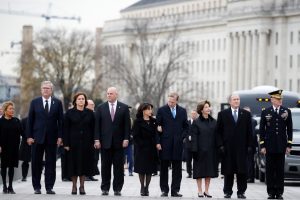
By Steve Holland
WASHINGTON (Reuters) – Former President George H.W. Bush was hailed at his state funeral on Wednesday as a warrior-statesman of uncommon personal kindness who went from being a hero of American conflicts to representing a bygone era of civility in politics.
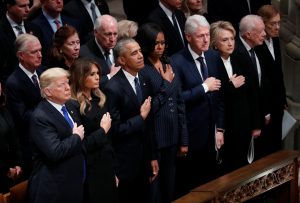
U.S. President Donald Trump and first lady Melania Trump stand with former President Barack Obama, former first lady Michelle Obama, former President Bill Clinton, former first lady Hillary Clinton, former President Jimmy Carter and former first lady Rosalynn Carter in the front row at the state funeral for former U.S. President George H.W. Bush at the Washington National Cathedral in Washington, U.S., December 5, 2018. REUTERS/Kevin Lamarque
Amid an unusual bipartisan spirit at the service at the Washington National Cathedral, both Republican and Democratic politicians honored a president who called for a “kinder, gentler” nation.
Bush, the 41st U.S. president, died last week in Texas aged 94. He occupied the White House from 1989 to 1993, navigating the collapse of the Soviet Union and expelling former Iraqi President Saddam Hussein’s forces from oil-rich Kuwait.
“George H.W. Bush was America’s last great soldier-statesman,” Jon Meacham, a presidential biographer, said in a eulogy. “He stood in the breach in the Cold War against totalitarianism. He stood in the breach in Washington against unthinking partisanship,” he said.
At a ceremony full of pomp but also peppered with laughter, the capital’s current political feuds were briefly set aside in honor of the late president, a naval aviator who survived being shot down by Japanese forces over the Pacific Ocean in World War Two, and a former head of the CIA during the Cold War.
A patrician figure, Bush was voted out of office in part for failing to connect with ordinary Americans during an economic recession.
But he has been remembered as representing an earlier era of civility in American politics, that image burnished in recent years by the divisiveness and anger in the United States that accompanied the rise of President Donald Trump.
Former President George W. Bush said his father “valued character over pedigree, and he was no cynic. He’d look for the good in each person, and he usually found it.”
“The best father a son or daughter could ever have,” the former president said in his eulogy, his voice cracking with emotion as he spoke near his father’s flag-draped coffin.
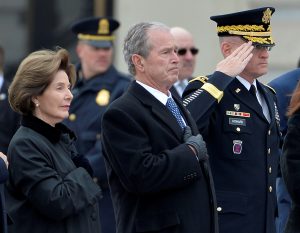
Former President George W. Bush places his hand over his heart with Laura Bush as they watch the casket of the late former President George H.W. Bush depart the U.S. Capitol enroute to the National Cathedral for funeral services, Washington, U.S., December 5, 2018. REUTERS/Mike Theiler
TEARS AND MEMORIES
Taking his seat at the cathedral, Trump shook hands with his predecessor, former President Barack Obama, who he has often sharply criticized.
Democratic former Secretary of State Hillary Clinton, Trump’s 2016 election opponent, and her husband former President Bill Clinton shared the front pew with Trump, Obama, and their spouses.
Trump, like Bush a Republican, infuriated the late president by attacking his sons, George W. Bush and Jeb Bush, a rival in the 2016 Republican primary campaign.
Trump sat mostly motionless next to first lady Melania Trump throughout much of the service.
He had tweeted earlier that he was “Looking forward to being with the Bush family. This is not a funeral, this is a day of celebration for a great man who has led a long and distinguished life. He will be missed!”
Bush did not endorse Trump in the 2016 presidential election. He did not publicly say who he voted for but a source told CNN at the time that he had voted for Hillary Clinton.
Bush, who was ailing in recent years, did send Trump a letter in January 2017 saying he would not be able to attend his inauguration because of health concerns but wishing him the best.
All surviving former U.S. presidents were at the cathedral. During one of the eulogies, Bill Clinton wiped away tears and former first lady Michelle Obama leaned over to pat him on the arm.
‘RESOLUTE AND BRAVE’
Canadian former Prime Minister Brian Mulroney lauded Bush’s role in handling the end of the Cold War and helping the delicate reunification of Germany.
Bush put together a U.S.-led international coalition that ousted invading Iraqi forces from Kuwait in 1991 and was president when the Berlin Wall fell in 1989.
“When George Bush was president of the United States of America, every single head of government in the world knew that they were dealing with a gentleman, a genuine leader, one who was distinguished, resolute and brave,” he said.
The guest list included Britain’s Prince Charles and leaders from Germany, Jordan, Australia and Poland, along with a host of former world leaders, such as former British Prime Minister John Major, who was in office during Bush’s term.
Trump closed the federal government on Wednesday to mark a day of mourning for Bush, and several U.S. financial exchanges were closed.
During his presidency, Bush was dogged by domestic problems, including a sluggish economy, and he faced criticism for not doing enough to stem the tens of thousands of deaths from the AIDS virus ravaging America.
When he ran for re-election in 1992, he was pilloried by Democrats and many Republicans for violating a famous 1988 campaign promise: “Read my lips, no new taxes.” His opponent Bill Clinton coasted to victory.
An ad from the 1988 campaign also came back to haunt Bush and tarnish his reputation as a fair player.
A political group close to the Bush campaign was accused of racism after releasing an ad about African-American prisoner Willie Horton who raped a white woman after being released on furlough. The ad suggested that Bush’s Democratic presidential opponent Michael Dukakis had been weak on crime while governor of Massachusetts.
Bush is to be buried on Thursday at his Presidential Library and Museum in College Station, Texas.
Before Wednesday’s service, his body lay in state since Monday evening in the Capitol Rotunda in Washington.
Thousands of people filed past to pay their respects, some getting a chance to see Sully, a service dog who was Bush’s friendly companion. Sully became an internet sensation after being photographed lying next to his late master’s coffin.
(Additional reporting by Richard Cowan, Susan Heavey and Jeff Mason; Writing by Alistair Bell; Editing by Frances Kerry)


